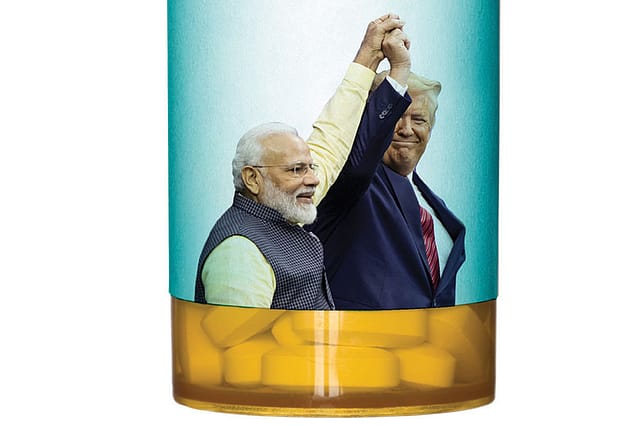Hydroxychloroquine: Collateral Medicine

HYDROXYCHLOROQUINE IS THE new sanjivani booti, the mythical herb that saved the life of Lakshmana in the Ramayana. In a letter to Prime Minister Narendra Modi, Brazilian President Jair Bolsonaro likened hydroxychloroquine to the ancient herb and Modi as the new Hanuman bringing the medicine to Brazil.
One can call this geopolitics by the mythological route. But after China's global grab of medical supply chains, the world is turning to India's pharmaceutical industry for essential supplies. Brazil is not alone. US President Donald Trump had a telephone conversation with Modi. On April 6th, Trump said in his comments, "I spoke to [Modi] Sunday morning, called him, and I said we'd appreciate your allowing our supply to come out. If he doesn't allow it to come out, that would be OK, but of course, there may be retaliation. Why wouldn't there be?"
This, and India's subsequent reaction, were interpreted as 'submitting' to the American threat of retaliation. By April 7th, Indian officials clarified that the drug would be available for export but its demand and supply would be monitored. A political firefight had broken out. Congress leader Rahul Gandhi tweeted: 'Friendship is not about retaliation. India must help all nations in their hour of need but lifesaving medicines should be made available to Indians in ample quantities first.'
There was nothing in what Government officials said that suggested India was buckling under pressure or that exports would be given preference over domestic supply. But that's how the sequence of events was interpreted.
Openomics 2026: Continuity and Conviction
06 Feb 2026 - Vol 04 | Issue 57
The performance state at its peak
All this comes against the backdrop of a single study last month in a scientific journal that reported that hydroxychloroquine was effective in handling coronavirus infections. The trouble was that it was a 'thin' study. But in a world reeling under the viral outbreak, even this single study led to a virtual stampede to secure supplies. The assertions by the US and Brazilian presidents that it was a "wonder drug" added to the rush.
In normal circumstances, no drug or medicine gets approved without extensive medical trials for efficacy and safety, trials that last for many years. Even in emergency situations, wonder drugs require extensive testing before approval is granted. At the moment, two large studies are going on involving coronavirus patients that use hydroxychloroquine. That has not stopped efforts by governments and individuals from garnering the drug. In the bargain, patients who use the medicine for other ailments, such as rheumatoid arthritis, are finding it very hard to source it. The lockdown and thin supply lines add to their woes.
India had banned the export of hydroxychloroquine on April 4th. But it was wise of the Government to quickly reverse its stand. Not doing so would have put India in the same corner as China, a country now seen as not just as the originator of the outbreak but also selfish in dealing with a humanitarian crisis.
In practical terms, there is no need for India to restrict supplies. There is a handful of Indian companies that produce the drug, but given its weak demand, it is used for very few medical conditions. There is excess production capacity. With galloping global demand, there is a very good case for these companies to ramp up production. That will help Indian commerce and aid India's foreign policy goals.
After globalisation, production facilities relocated to countries that had a comparative advantage in producing goods they specialised in. China became the hub of finished pharmaceuticals, active pharmaceutical ingredients (APIs), raw materials and intermediate products. As long as the wheels of commerce rolled on, supply and demand for these goods matched seamlessly.
But when a virus halted everything, different economic and political behaviour re-emerged. Instead of trade, mercantilism—and a very crude form of it based on hoarding life-saving items—reared its head; nationalism, again of
a crude variety, was there for everyone to see.
India does not have to sacrifice its interests in any way to step in where China left. It has the capacity to do what is necessary. This is the time for it to step up on the supply pedal. The world will appreciate it.
